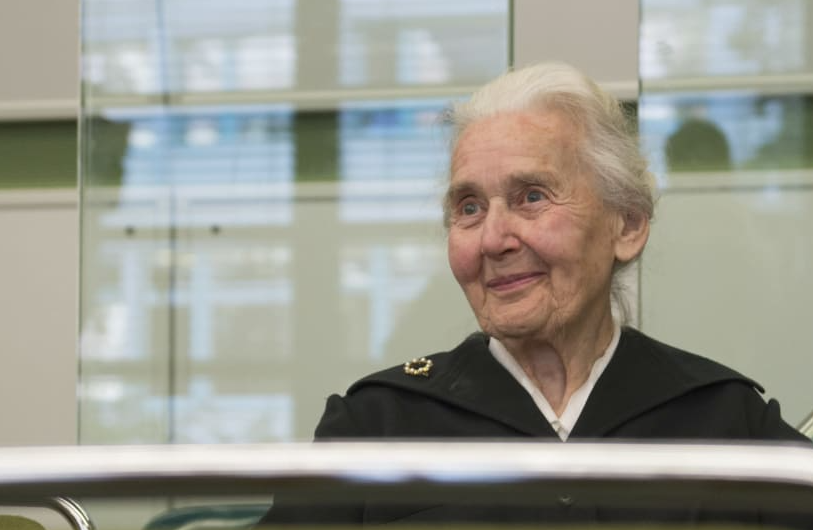
Unwavering Holocaust denier Ursula Haverbeck is once again facing prison time for her political speech, this time in a new trial for “inciting hatred” at the age of 95.
- Haverbeck, smeared as a “Nazi Grandma” by the mainstream press for numerous criminal convictions for questioning Jewish narratives about the Second World War, has been lionized by nationalists as a political prisoner.
- The current case against her stems from alleged comments made in a televised interview during the trial of Oskar Gröning, a former member of the Schutzstaffel, in 2015. Prosecutors claimed Haverbeck said that Auschwitz, famous for its wooden doors and swimming pools, was merely a labor camp.
- Haverbeck has also denied that so-called “mass extermination” occurred at Auschwitz. While the septuagenarian was previously sentenced to ten months in a German prison for this “crime,” she was able to file an appeal and avoided immediate arrest.
- Haverbeck appeared in a courtroom in Hamburg on Friday and was said to have been escorted by members of the forensic medical service due to her advanced age. If convicted, she could face up to five years in prison.
History of defiance: Haverbeck has become a notorious figure in radical politics for her repeated convictions for questioning the Holocaust.
- Haverbeck has been convicted to prison numerous times since 2015, from statements to written articles that deny the Holocaust. Due to the German appeals process, she has not spent any jail time yet.
- In 2016, she was convicted for articles written in Germany’s “Voice of the Reich,” newspaper, where she denied the Holocaust. One month prior, she was sentenced to 11 months for “incitement to hate,” and in 2016, she was sentenced to another 8 months for similar offenses.
- In 2009, Haverbeck was found guilty of “offending” Charlotte Knobloch, then president of the Central Council of Jews in Germany, who advocated censorship.
🧵THREAD🧵 6 of 9 Posts
— Truth Troll Official™️ (@truthtroll_X) June 9, 2024
Since then Haverbeck has been persecuted multiple times:
▪️In 2009 Haverbeck was sentenced to a fine of €2,700
▪️In 2016 at the age of 87 she was formally sentenced to 11 months in prison for "holocaust denial" without parole.
▪️Then again in 2017 at… pic.twitter.com/MJAa5IQ7pa
- In an open letter, Haverbeck wrote that Knobloch shouldn’t “interfere in German domestic affairs…if Knobloch does not like it in Germany, then she could “return to her origin in Inner Asia,” and, “You do not have to live in Germany— in this evil land, where, as you say, six million of you were gassed.”
The big picture: The German people have long faced stifling government persecution and other outrages stemming from a perceived sympathy for the Nazi era and its figures.
- Due to a series of strict hate speech and antifascism laws enshrined in post-war Germany, denial of the holocaust or its trivializing is considered a crime if it is “done at a meeting or in public in a way that is likely to disturb the public peace.”
- In April, four Germans were arrested for merely leaving flowers on the window recesses of Adolf Hitler’s childhood home in Austria. The historical building was converted into a police station in order to deter nationalists from turning it into a pilgrimage site.
- In January, Germans in the city of Dresden faced accusations of “neo-nazi” after a commemorative inscription honoring those killed during the Allied firebombings during the Second World War was unceremoniously sanded away.
Have a story? Please forward any tips or leads to the editors at [email protected]













